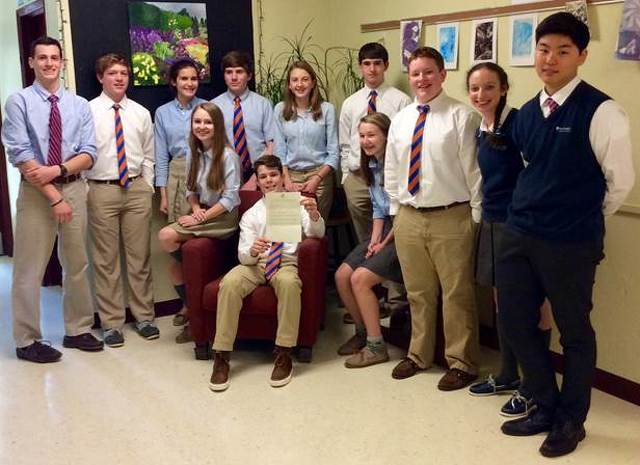Last month, Laura Cunningham’s ninth-grade English students at St. Joseph’s Catholic Academy in Boalsburg received a letter from Nobel Peace Prize winner Elie Wiesel thanking them for writing to him as part of an assignment for class.
“Keep learning and reading, more and more, to continue to think higher, and feel deeper,” said Wiesel in his letter, which thanked the students for their kind words and responded to their questions about keeping faith in times of hardship.
After reading Wiesel’s 1960 memoir “Night,” which chronicles his experiences in concentration camps during the Holocaust, Cunningham prompted her students to compose a letter detailing how reading the book impacted them and posing questions to the author.
‘I felt that rather than administering a formal test at the end of this novel, that my students would be able to take away more by being given the opportunity to address Mr. Wiesel directly,’ she said.
”Night’ is an emotional and difficult text to read, and this letter afforded my students a sort of closure that a generic test could not provide.’
Cunningham was impressed by her students’ responses.
‘They were exceptionally thoughtful and reflective in their approach. My students were also able to showcase their strong writing, reflective and inquisitive abilities through their letters.’
Both the reading and writing components of the assignment required students to face uncomfortable subject matter, try on a new perspective and cultivate empathy. Students were inspired by Wiesel’s enduring faith in dark times.
‘I believe that God has blessed everyone with the ability to make good out of the bad in the world,” said student Christian Chirieleison in his letter to Wiesel. “I greatly appreciate that you took this blessing and used it to make the world a better and more peaceful place. I appreciate that you told the world your story that needed to be told and I appreciate you for finding light in this world of darkness and night.’
‘This assignment enabled my students to take ownership and pride over what they were writing,” said Cunningham, “because they knew that I was sending the letters to the author. This added a sort of new element into their typical homework in that I would not be the only one reading their work.’
She sent the students’ letters to The Elie Wiesel Foundation For Humanity in New York.
Cunningham and her students were pleasantly surprised to receive a response letter from Wiesel dated March 7. ‘I felt very humbled that such a prolific author, and human being, took the time to write back to my students,’ she said.
Her excitement was matched by her students’. ‘When I pulled out the letter and began reading it, you could hear a pin drop in my classroom. My students clung to every word that Mr. Wiesel shared for they understood and appreciated the depths from which he wrote.’



